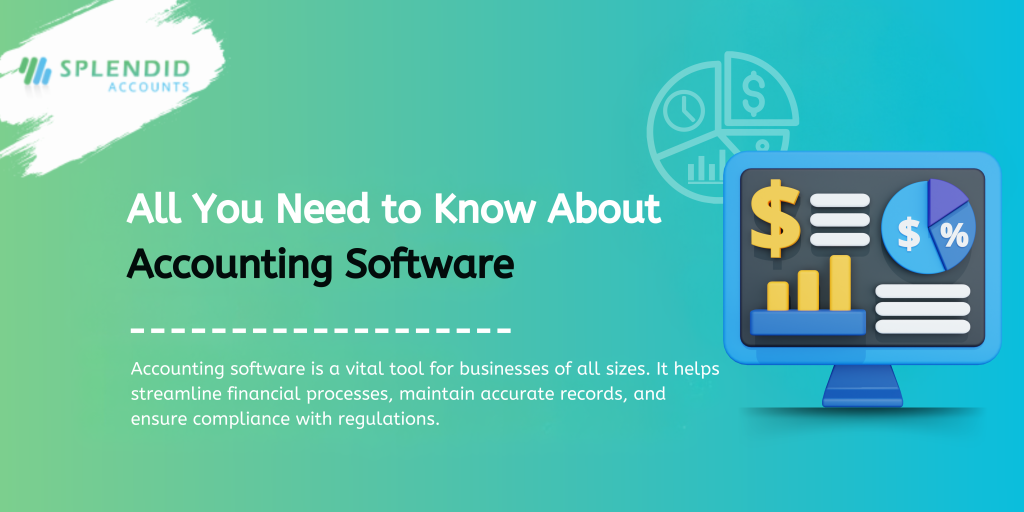
Understanding Accounting Software: The Basics
What is Accounting Software?
Accounting software is a computerized system that manages various aspects of financial transactions. It allows businesses to track income and expenses, manage invoices, process payroll, and generate financial reports. Accounting software is essential for modern businesses as it enhances operational efficiency, reduces errors, and provides valuable insights into financial health.
1. Types of Accounting Software
Desktop Accounting Software: Installed on individual computers, this type offers full functionality without needing an internet connection.
Cloud-Based Accounting Software: Accessible via the internet, these solutions offer flexibility and real-time updates. Users can access their accounts from any device.
Enterprise Resource Planning (ERP) Systems: Comprehensive software that integrates accounting with other business functions like inventory, sales, and HR.
Industry-Specific Software: Tailored solutions for specific industries, such as retail, manufacturing, or non-profit organizations. These often include unique features relevant to the industry.
2. Key Features
General Ledger: Core component for recording all financial transactions.
Accounts Payable and Receivable: Management of bills and invoices, ensuring timely payments and collections.
Bank Reconciliation: Automated matching of transactions between bank statements and accounting records.
Financial Reporting: Generation of reports like income statements, balance sheets, and cash flow statements for analysis.
Expense Tracking: Tools to monitor and categorize expenses.
Invoicing: Creation and management of invoices, including recurring billing features.
Payroll Processing: Calculation and management of employee salaries, taxes, and benefits.
Multi-Currency Support: Essential for businesses operating internationally, allowing transactions in different currencies.
Integration Capabilities: Ability to connect with other software tools (e.g., CRM, e-commerce platforms) for seamless data flow.
3. Benefits of Accounting Software
Efficiency: Automates routine tasks, reducing time spent on manual entries and calculations.
Accuracy: Minimizes human error in financial records, leading to more reliable data.
Real-Time Insights: Provides up-to-date financial information, aiding in better decision-making.
Cost-Effective: Reduces the need for extensive bookkeeping services, making it more affordable for small businesses.
Scalability: Many accounting software options can grow with your business, accommodating increasing transaction volumes and complexity.
Regulatory Compliance: Helps businesses stay compliant with financial regulations and tax laws through accurate reporting and documentation.
4. Choosing the Right Accounting Software
Identify Your Needs: Assess your business size, industry, and specific accounting requirements (e.g., invoicing, payroll).
User-Friendliness: Look for intuitive interfaces that simplify navigation for users with varying levels of accounting knowledge.
Cost Consideration: Evaluate the pricing model (subscription vs. one-time fee) and ensure it fits within your budget.
Customer Support: Consider the level of support provided, including online resources, live chat, or phone support.
Trial Periods: Take advantage of free trials to test functionality and ease of use before making a commitment.
Reviews and Recommendations: Research user reviews and seek recommendations from other businesses in your industry.
Industry-Specific Features of Accounting Software for Pakistan
Retail
In the retail sector, accounting software should provide seamless integration with inventory management systems to track stock levels and calculate the cost of goods sold accurately. It’s essential for the software to automate the recording of sales transactions through Point of Sale (POS) systems, which reduces manual entry errors. Given the complexity of sales tax in Pakistan, the software must also automate sales tax calculations based on local regulations, ensuring compliance and efficiency.
Wholesale
For wholesale businesses, accounting software should offer features that manage large volumes of transactions and track customer orders effectively. Bulk invoicing and payment processing are essential to streamline operations. Additionally, the software should include inventory tracking capabilities that manage stock levels across multiple warehouses, as well as tools for forecasting demand based on historical data.
Distribution
Distribution companies require accounting software that can handle complex supply chain management. Key features include order management, shipment tracking, and vendor management to ensure smooth operations. The software should also provide detailed reporting on inventory turnover and logistics costs, helping distributors make informed decisions and improve efficiency.
Manufacturing
Manufacturers need accounting software that supports job costing and tracks expenses related to production. Features like Bill of Materials (BOM) management and production scheduling are crucial for maintaining efficiency. Additionally, supporting different inventory valuation methods, such as FIFO (First In, First Out), is important for accurate financial reporting and cost control.
